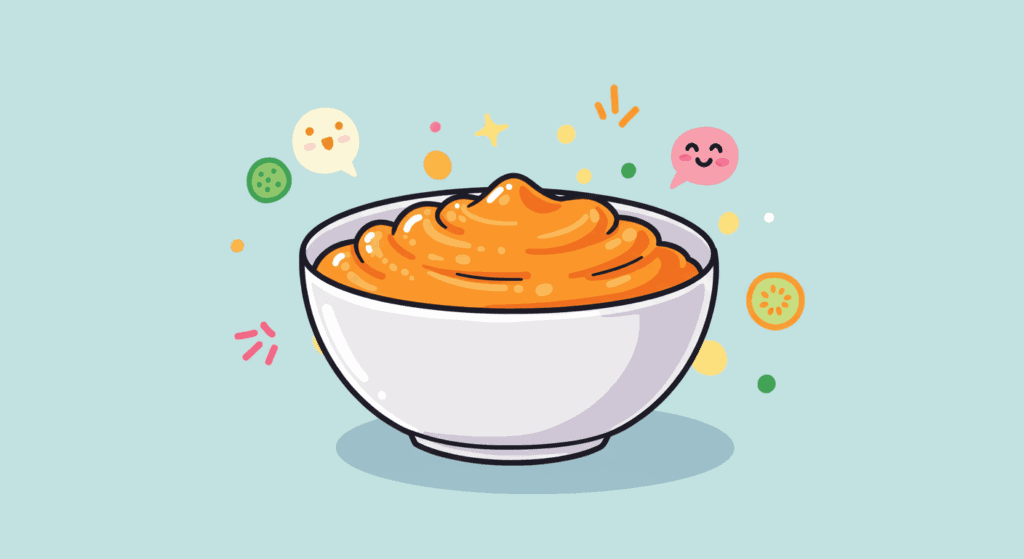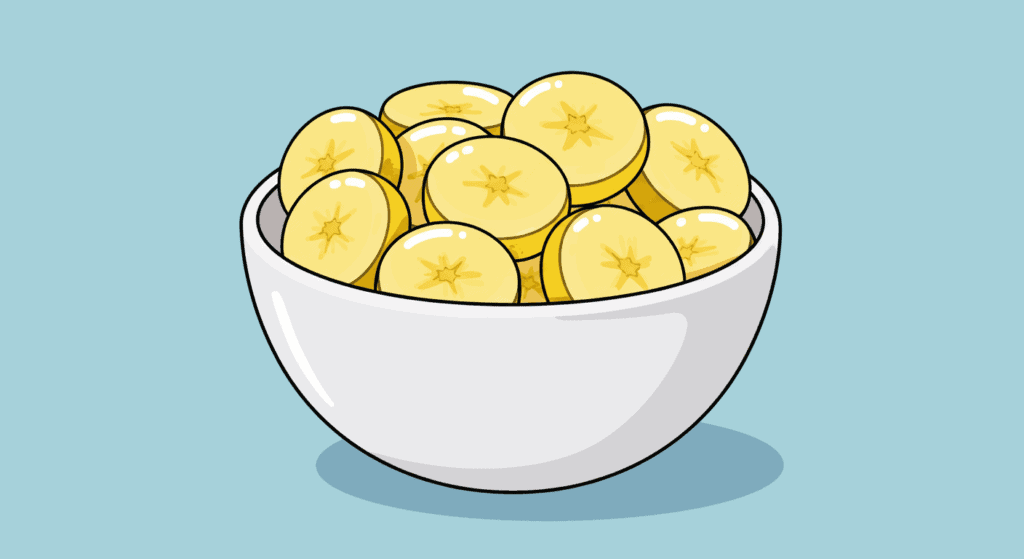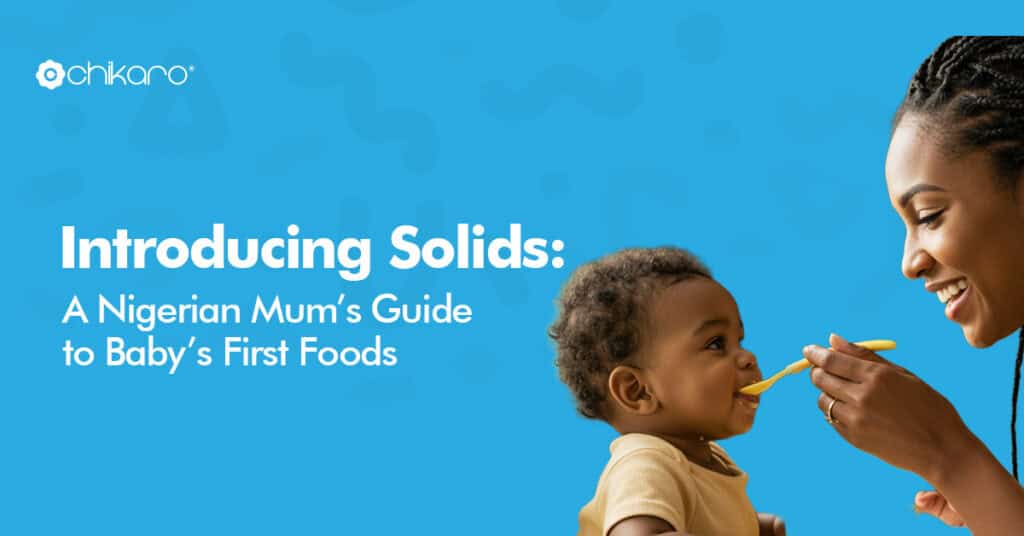Starting solids is one of the most exciting milestones in your baby’s first year. From messy mouths to wide-eyed reactions at new tastes, it’s a journey filled with laughter, learning, and sometimes a little anxiety. If you’re a Nigerian mum wondering when, how, and what to start feeding, this detailed guide is for you.

At Chikaro, we’re committed to giving practical, culture-conscious advice. That’s why we created this all-in-one guide about introducing solids to your baby the Nigerian way covering signs of readiness, local meal ideas, feeding schedules, and tools to make weaning stress-free.
By the end, you’ll feel equipped, reassured, and excited about this next phase of motherhood.
Why Introducing Solids to Your Baby Is a Big Deal
The shift from exclusive breastfeeding to solid foods marks a major step in your baby’s growth. At around six months, breast milk alone can no longer provide all the nutrients your baby needs.
Key nutrients like iron, zinc, and protein become especially important at this stage, and these are found in solid foods. That’s why introducing solids to your baby at the right time is essential.
In Nigeria, many families start pap (ogi), rice cereal, or mashed fruits as first foods, but knowing what works and when is crucial. This journey isn’t just about feeding, it’s about setting healthy eating habits for life.
A key reminder: introducing solids to your baby should complement breastfeeding, not replace it. Breast milk or formula still remains their main source of nutrition until age one.
When to Start Introducing Solids to Your Baby
The World Health Organization (WHO) recommends exclusive breastfeeding for the first six months. After that, complementary feeding begins while breastfeeding continues.
But how do you know when your little one is truly ready? Not every baby follows the exact same timeline. Some show interest a little earlier, while others need more time.
Signs Your Baby Is Ready for Solids
Look for these clear signals around 5.5 to 6 months:
- Sits upright with minimal support – helps swallowing safely.
- Shows curiosity about food – reaching for your plate is a big clue!
- Loss of tongue-thrust reflex – baby no longer pushes food out with their tongue.
- Can hold head steady – important for safe swallowing.
- Opens mouth when offered food – shows interest and readiness.
Many Nigerian mums say babies try to “snatch” meat or amala from their plate around this age, that’s a classic sign. Still, wait until your baby shows all readiness cues before introducing solids to your baby.
What to Offer First: Nigerian-Friendly Options
The good news? You don’t need imported baby food jars. Nigeria is full of natural, nutrient-rich, baby-friendly foods.
Stage 1 (6–7 Months): Purees & Single-Grain Meals
Start simple with one-ingredient meals:

- Mashed pawpaw (papaya) or banana.
- Rice cereal (local rice blended to powder and cooked soft).
- Ogi (fermented pap) thinned with breast milk or formula.
- Mashed Irish potatoes or sweet potatoes.
- Mashed avocado.
Pro tip for introducing solids to your baby: Introduce one food every 3–5 days. This makes it easier to spot allergies or sensitivities.
Stage 2 (7–9 Months): Soft, Lumpy Foods
At this stage, babies can handle more texture. Nigerian foods are perfect here
- Mashed beans or soft moimoi (no pepper).
- Mashed yam or ripe plantain.
- Light ewedu or okra soup with soft amala.
- Boiled egg yolk mashed smooth.
- Soft millet pap with mashed fruits.
Important for introducing solids to your baby: Avoid adding salt or Maggi cubes – babies’ kidneys aren’t ready for it.
Stage 3 (9–12 Months): Finger Foods
Now your baby wants to feed themselves! Encourage independence with soft, bite-sized pieces.

- Small fruit slices (banana, pawpaw, mango).
- Mini akara (bean cakes made without pepper).
- Soft avocado cubes.
- Shredded boiled chicken or fish (boneless).
- Soft boiled plantain strips.
Finger foods encourage self-feeding, hand-eye coordination, and chewing skills.
Practical introducing solids to your baby advice: Always supervise finger foods to prevent choking.
Feeding Tips for Nigerian Mums
The process of introducing solids to your baby is about patience, consistency, and fun. Here are tested tips:
- Stay patient – Baby may spit food out, frown, or play with it. This is normal.
- Use soft plastic spoons – Metal spoons may hurt tender gums.
- Offer water in a sippy cup – Babies need extra hydration when solids start.
- Avoid force-feeding – Respect baby’s appetite; forcing can create negative associations with food.
- Prepare meals fresh daily – Or freeze in small containers for busy days.
- Keep feeding calm and positive – Smile, talk, and encourage.
Golden introducing solids to your baby tip: Meal times are learning times, not just feeding. Babies learn by watching you eat too.
Foods to Avoid in the First Year
Some foods are not safe for babies under 12 months.
- Honey – risk of infant botulism.
- Cow’s milk as main drink – not suitable until 1 year.
- Fried foods and processed snacks – too much oil, salt, and additives.
- Uncooked eggs or fish – risk of infection.
- Whole nuts – choking hazard.
A health-focused introducing solids to your baby reminder: Always check for choking hazards and cook food thoroughly.
Sample Feeding Schedule (6–8 Months)
Here’s a simple starter plan:
- Morning – Breast milk + 2–3 spoons of ogi or mashed fruit.
- Midday – Breast milk or formula.
- Afternoon – Mashed yam or potato with vegetables.
- Evening – Breast milk + mashed banana or rice cereal.
As your baby grows, increase food portions slowly while continuing breast milk.
A flexible introducing solids to your baby principle: Babies’ appetites vary. Some days they eat well, others not so much – don’t panic.
Must-Have Weaning Essentials
The right tools make the journey smoother. Nigerian mums benefit from these basics:
- Baby feeding spoons – gentle on gums.
- BPA-free plates and bowls – safe and durable.
- Sippy cup or small open cup – for learning to drink.
- Bibs – cloth or silicone to catch messes.
- Food processor or blender – for smooth purees.
- Food storage containers – portion and freeze meals.
At Chikaro, we recommend baby-safe bowls, silicone bibs, and soft spoons for mums starting solids.
Handy introducing solids to your baby tip: Keep a “feeding station” stocked with bibs, wipes, and spoons, it saves stress during messy moments.
Nigerian Cultural Context for Weaning
In Nigeria, family traditions often influence how and when babies are introduced to food. Some relatives may encourage early feeding with pap or even water before six months.
Practical introducing solids to your baby reminder: Share WHO guidelines with family members kindly. Many grandparents fed differently, but times and knowledge have changed.
Encouraging family support makes weaning smoother and less stressful for mums.
Common Questions Nigerian Mums Ask
1. What if my baby refuses solids?
Don’t panic. Keep offering. Sometimes it takes 8–10 tries before babies accept new foods.
2. Can I add crayfish or fish powder?
Yes, after 7 months, in small amounts for protein and flavour.
3. What about pepper?
Avoid hot pepper in the first year. Babies’ digestive systems can’t handle it.
These Q&As are some of the most reassuring introducing solids to your baby advice Nigerian mums find helpful.
Working Mums and Baby Solids
Returning to work while introducing solids to your baby requires planning.
- Prepare small meals ahead and refrigerate/freeze.
- Train caregivers on portion sizes and safety.
- Pack meals in insulated containers.
- Write down baby’s feeding schedule.
Smart introducing solids to your baby tip: Prepare large batches of beans, yam, or ogi base and freeze in portions, it saves time during busy workweeks.
Final Thoughts
Introducing solids isn’t about perfection, it’s about exploration. Your baby may reject a spoon today and gobble it up tomorrow. The key is patience, variety, and keeping meals positive.
This guide has shown you everything from signs of readiness, Nigerian-friendly first foods, feeding tips, schedules, and cultural considerations all wrapped in practical, supportive advice.
At Chikaro, we believe every Nigerian mum deserves confidence on this journey. With simple, healthy local meals and the right tools, introducing solids to your baby can be joyful, stress-free, and rewarding.
Remember: Your baby is learning, not just eating. And with these trusted introducing solids to your baby tips, you’re setting the foundation for a lifetime of healthy eating.






